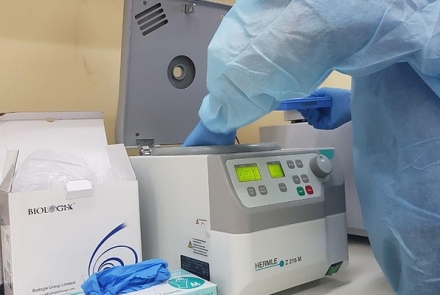
Photo by IAEA on Flickr
Vaccination is critical, but not a substitute for COVID-19 management policies
By Andree Surianta
Disclaimer: This article was originally published in Indonesian language by The Conversation Indonesia on 8 January 2021. The original article can be accessed here.
Unlike waves of COVID-19 infections experienced by most countries, Indonesia’s pandemic numbers have been on a consistent upward march since the first cases were detected. A lack of mobility restrictions, low utilisation of test-and-trace resources, and misuse of antibody tests have contributed to this failure.
After facing a year of struggles, the Indonesian government has now seemingly placed all bets on a mass vaccination drive.
There is an impression that the arrival of vaccines will redeem the country’s past failures in controlling the pandemic. However, these failures are more a product of policies that ignore science rather than a lack of tools.
The United States Centers for Disease Control and Prevention (CDC) emphasised that vaccines are only one method of controlling COVID-19 spread. Slowing down the pandemic does not depend soley on vaccines, but also on precise tracking of cases and consistent implementation of preventive measures.
As a public policy researcher and a COVID-19 survivor, I am concerned that the euphoria with vaccination can further diminish the already sub-optimal pandemic control efforts.
Moreover, the Indonesian Ministry of Health estimates that it will take 15 months to implement four waves of vaccination across the archipelago. There is no data yet whether the antibodies triggered by the vaccines can last that long. So, it is very possible that those vaccinated during the first or second vaccination wave will no longer be immune by the time the program is complete. When immunity fades, only preventive measures can suppress transmission.
Therefore, as the country is gearing up for its mass vaccination campaign, the Indonesian government should revise inappropriate screening procedures, increase test-and-trace capacity, and push personal preventive measures even more strongly if there is to be any hope of controlling the pandemic.
Is screening to find virus or antibodies?
In Indonesia, the blood-based rapid detection test (RDT) for antibodies is more popular than PCR swab tests for screening virus carriers because the former only takes 10-15 minutes while the latter requires between six hours to three days to get a result. The need for specialist skill and equipment also made PCR test 10-20 times more expensive than RDT antibody.
However, the antibody RDT does not detect viruses but rather virus-neutralising antibodies which lags infection. In practice, when someone tests positive for antibodies, they are tested again with the PCR method. This practice risks missing people who already carry the virus but have not produced antibodies as their antibody RDT result will turn up a negative, precluding them from a PCR test. Therefore, the United States Food and Drug Administration (FDA) insists that antibody tests should not be used to assess current infections and infectiousness. WHO also does not recommend RDT antibodies as a virus screening tool and the gold standard for tracking COVID-19 is the PCR test.
The government needs to immediately rectify the misuse of RDT antibody for screening. In fact, antibody RDTs are more appropriate for monitoring vaccination success instead of viral screening.
RDT antigen: a new tracing tool for the pandemic
Vaccines are expected to trigger immune response in its recipients, but this process takes time. For COVID-19 vaccines, usually each recipient needs two doses several weeks apart.
Thus, testing and tracing - with the appropriate method - should still be carried out during mass vaccination to maintain public health vigilance.
RDT antigen is a new technology that can fill the gap left by testing capacity shortage in Indonesia. The Indonesian public has only begun to know this test since December as it substitutes RDT antibodies for pre-travel screening to Java and Bali.
In the US, this test is recognised as one of COVID-19 diagnostic tests since last July. In India, the test was key in increasing diagnostic capacity from around 300,000 people per day in July 2020 to more than one million people per day a month later.
RDT antigen can detect the presence of viral proteins in the respiratory tract via a swab test in less than 30 minutes. So, this test works similarly to PCR - although it detects different viral components and less sensitive - but at the speed of an antibody RDT.
For the purposes of tracing the virus, an antigen test is more appropriate than the antibody test. While boosting PCR testing capacity is important, RDT antigen can be used to patch up for the lack of screening capacity at the moment.
The government should consider expanding this test to a national scale, not only in Java and Bali. WHO has also approved the use of RDT antigens for COVID-19 tracing in low- and middle-income countries, such as India and Slovakia.
Maintaining preventative measures
The existence of a vaccine does not mean that preventative protocols can be abandoned. Vaccinated individuals remain susceptible to infection during the between-doses period and even the CDC recommends maintaining mask-wearing, handwashing, and social distancing after being vaccinated. This is because there is no data yet on how long the resulting antibodies will persist.
The super-fast development of COVID-19 vaccines has been impressive, but it also means that there is simply not enough time yet to observe the longevity of antibodies produced.
Experts have warned that the presence of vaccines will not immediately eradicate COVID-19. The existence of vaccines must be accompanied by improved screening policies, increased diagnostic capacity, and implementation of preventive protocols as a new lifestyle.
How quickly this pandemic can be brought to heel does not depend on vaccines alone, but also on a strong commitment to the implementation of existing pandemic management policies.
Andree Surianta is an Australia Awards PhD scholar in the Policy & Governance Department at the Crawford School of Public Policy
Updated: 2 July 2024/Responsible Officer: Crawford Engagement/Page Contact: CAP Web Team












